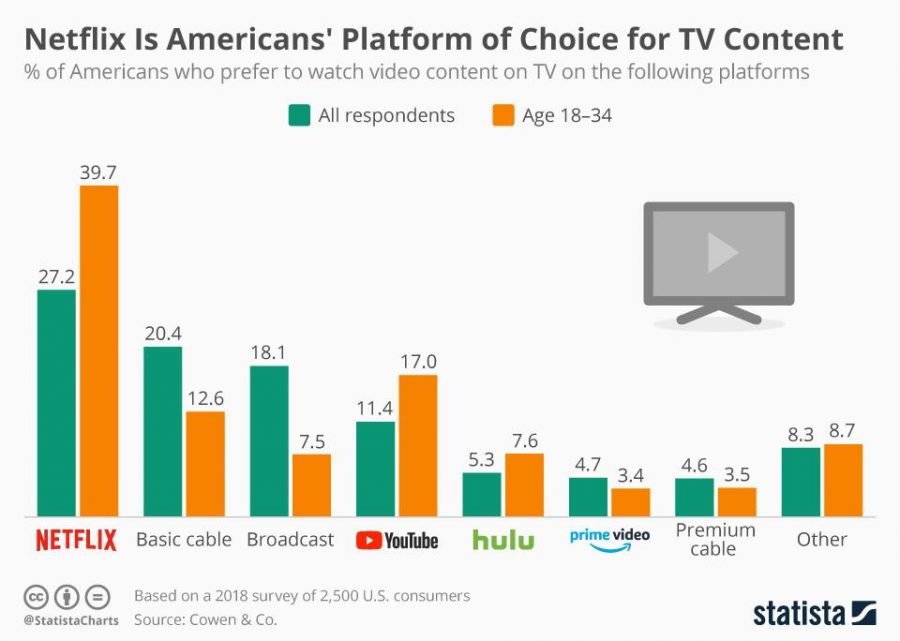Binge Culture: The Depreciation of Appreciation
Netflix has become the mainstream source of home entertainment.
October 29, 2019
With the immense boom in recent years, streaming services have overtaken cable TV as the primary source of entertainment. Convenient and fast services like Netflix drop entire seasons for eager fans to binge-watch. Everyone has binged something, whether it be Stranger Things, The Umbrella Academy, or 13 Reasons Why. However, while Netflix subscribers enjoy access to entire seasons all at once, it narrows the enjoyment of the show down to a single streamlined watch. The short attention span of our generation leads us to seek out quick entertainment and the feeling of closure, which Netflix takes advantage of by dropping ready-to-binge content. When was the last time you were left with the suspense of a cliffhanger in the middle of a show and had to wait a week to find out what happens next? When was the last time you thought to yourself “that was a really good episode” instead of “that was a good show”? Suspense and impactful moments are completely removed with the new binge-watching format, providing quick resolutions and short term enjoyment, while harming long term appreciation. This accommodation of binge-available content comes with the price of our enjoyment and lack of appreciation for shows that deserve to be put in the spotlight but are instead tossed to the side quickly.
Binge culture encourages viewers to watch an entire season all at once, disregarding any moments that deserve a pause and thought to fully appreciate and enjoy. Shows like The Umbrella Academy have a myriad of small moments that deserve individual attention, yet no one stops to do so. Binge-watching has normalized the expendability of entertainment, making these shows an object to enjoy then throw away afterward. While it does give viewers a choice to watch at their own pace, many usually binge-watch the entire season to avoid spoilers and because the act itself is highly addictive: research shows that binge-watching has the same effect on people as some drugs. This is doing a massive disservice to the creators and actors that all play a part in creating the show to be meaningful. Stranger Things, for example, has never been appreciated for a single episode across all of its seasons. Instead, the 824,000 viewers that watched season three on the first day it was released and the 12.8 million viewers who watched it within four days just saw the season as another good watch. Usually, the hype is only present when the season airs. But as time goes on, many people are just left waiting for the next season to arrive just to have something to talk about again.
Compare this to shows that have weekly releases. Cliffhangers, plot twists, and surprises aren’t resolved right away as you need to wait a week to see what happens next. Take for example Demon Slayer. The show has a weekly release of episodes that allow viewers to have a week in between to discuss, speculate, and appreciate the week’s episode; all of this giving meaningful impact to what happened in the episode and allowing us to find the entire viewing experience much more enjoyable and fulfilling rather than being a mindless watch. Episode 19 received so much attention that it trended worldwide on Twitter; this is especially impressive as Demon Slayer is an anime, which rarely breaks out of the relatively small community of viewers. The author (the show is an adaptation of a manga of the same title) even wrote a notice saying that she cried after watching the episode air and seeing the enjoyment it brought to all of its viewers. The episode struck a chord across the world, creating a lasting impression of the show that would not have existed otherwise if the show released its entire season all at once. And what greater appreciation of a show could viewers express to the creators than to unanimously point towards a single episode and call it a masterpiece.
Binge culture has made it much harder to appreciate what made entertainment so great in the first place. Great acting, music, cinematography, and emotional weight all add to the overall enjoyment of a show. With the high-speed binge culture that is omnipresent today, it is hard to grasp this type of enjoyment anymore, quickly making the efforts of the creators of the show seem meaningless. Creators spend years trying to perfect a show and make their vision a reality. However, binge culture makes all of their efforts go to waste. Sure, hundreds of thousands of people are watching something that they created. Yet these hundreds of thousands will not understand their vision and view their show as a work of art. Instead, it is just another show in the sea of many. With everything in the world growing increasingly fast, to the point where the appreciation of art and entertainment is now being mainstreamed to be quick and disposable, we should consider slowing down once in a while to appreciate what we are given.










